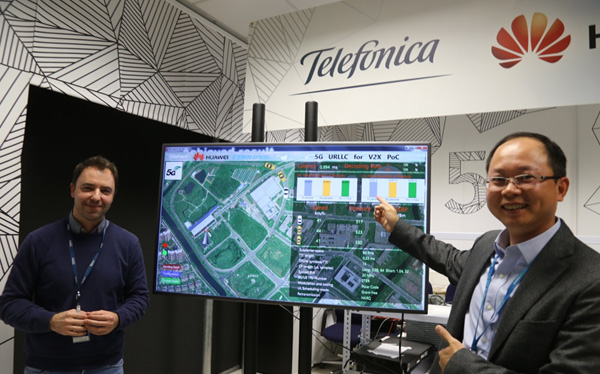World’s First Successful Proof-of-Concept Test of 5G-V2X Radio for uRLLC Assisted Driving
Telefónica and Huawei have achieved a new milestone with the world’s first Proof-of-Concept (PoC) testbed for 5G based vehicle communication networks (known as 5G-V2X) in their 5G Joint Innovation Lab at Madrid. This is another solid step to promote 5G commercialization and expand the 5G ecosystem after both companies completed 5G UCNC trial in 2017.
World’s First Proof-of-Concept Test of 5G-V2X Radio for uRLLC Assisted Driving
5G-V2X is widely recognized as the first and most important vertical industry which will be enabled by 5G innovations. The test for 5G-V2X technology is based on the latest 3GPP New Radio (NR) Standard specification available since December 22nd, 2017. Some of the most advanced 5G-V2X services include vehicles platooning, extended sensors, advanced driving and remote driving, among others. Enabling the capability for self-driving will require further enhancements of the 5G NR system, in conjunction with a new NR Sidelink to allow vehicle-to-vehicle communications.
Due to the stringent requirements imposed by the high reliability and fast reaction times that characterize autonomous driving, the so-called Ultra-Reliable and Low-Latency Communication (URLLC) mode for 5G NR offers the flexible design to support services with low latency and high reliability requirements. In this PoC test, it was demonstrated that URLLC can effectively support V2X with higher system capacity and better coverage. The exercise achieved 99.999% reliability with a low latency of 1ms required for autonomous driving in a typical macro cellular outdoor environment, such as dense urban, suburban and rural areas. The PoC test will lay the foundations for large-scale field trials with the upcoming commercial deployments of 5G wireless networks worldwide.
In the 5G-V2X PoC, a novel self-contained frame structure for radio transmission was used, both from the base station to the vehicle and from the vehicle to another vehicle. This allows much faster transmission feedback, enabling very low-latency communications. The great flexibility of the NR system framework allows the support of some advanced features, like Polar coding for small V2X packet error correction, an optimized HARQ (Hybrid Automatic Repeat Request) procedure for increased transmission reliability, or an ‘Inactive State’ for instantly sending short packets to control the car maneuver. To further enhance performance, another key technology, ‘SCMA-based (Sparse Coded Multiple Access) Grant Free Access, was tested. This technology is designed to simplify uplink access procedures to significantly reduce transmission latency.
In the PoC, vehicles platooning is used as a typical test case for the advanced V2X services, where the platoon members are controlled by the 5G NR network. The PoC conducted at the Telefónica-Huawei 5G Joint Innovation Lab has shown that 99.999% reliability can be achieved within 1 ms round trip delay constraint, and the signaling overhead can be decreased by 67% compared with state-of the-art cellular systems.
Enrique Blanco, Telefónica Global CTIO, said: “This PoC between Telefónica and Huawei is another step towards 5G commercialization and a fully connected society. We will strengthen our collaboration by verifying 5G key technologies. Multiple novel use cases will be developed and provided to our customers.”
Dr. Wen Tong, Huawei Fellow and Huawei Wireless CTO, said: “We are pleased with our further collaboration with Telefónica in 5G technologies. The 5G-V2X PoC is another joint effort to pave the way for commercialization of 5G and lay a solid foundation to realize the 5G vision of enabling cooperative autonomous driving.”




